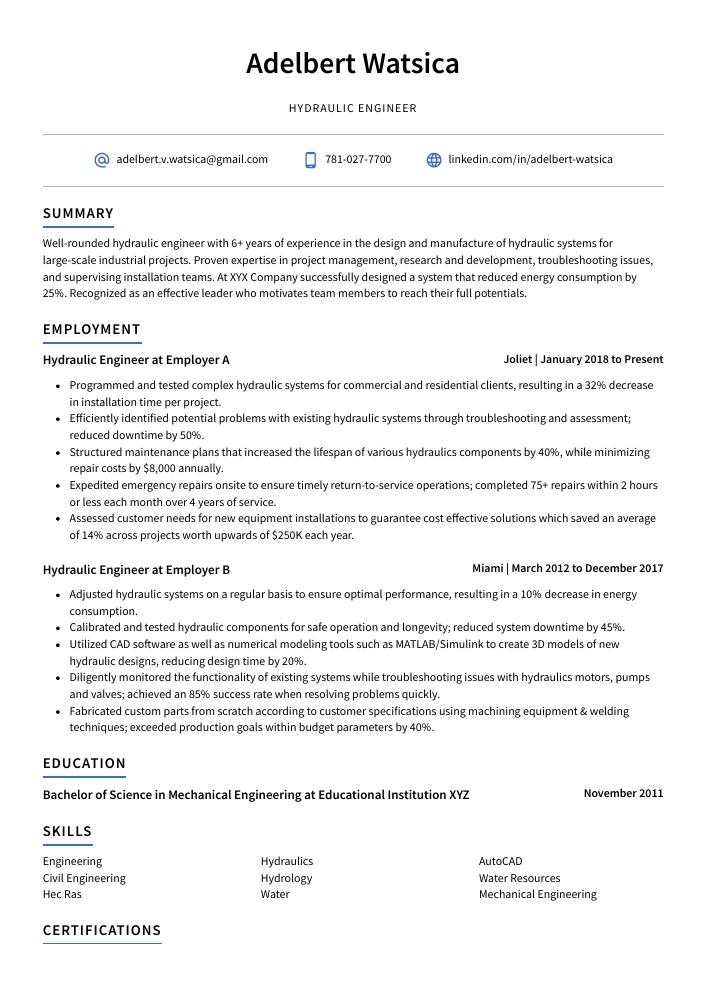Hydraulic Engineer Resume Guide
Hydraulic engineers design, develop and implement systems that use pressurized liquids to generate power. They calculate the forces of liquids on structures such as dams or bridges, create plans for hydraulic projects and operate machinery used in these projects. Additionally, they often inspect existing hydraulic equipment to ensure it is functioning properly.
Your expertise in the field of hydraulic engineering is unparalleled, but potential employers don’t know that! To make sure they recognize your talent, you must write a resume that emphasizes your experience and qualifications.
This guide will walk you through the entire process of creating a top-notch resume. We first show you a complete example and then break down what each resume section should look like.
Table of Contents
The guide is divided into sections for your convenience. You can read it from beginning to end or use the table of contents below to jump to a specific part.
Hydraulic Engineer Resume Sample
Adelbert Watsica
Hydraulic Engineer
[email protected]
781-027-7700
linkedin.com/in/adelbert-watsica
Summary
Well-rounded hydraulic engineer with 6+ years of experience in the design and manufacture of hydraulic systems for large-scale industrial projects. Proven expertise in project management, research and development, troubleshooting issues, and supervising installation teams. At XYX Company successfully designed a system that reduced energy consumption by 25%. Recognized as an effective leader who motivates team members to reach their full potentials.
Experience
Hydraulic Engineer, Employer A
Joliet, Jan 2018 – Present
- Programmed and tested complex hydraulic systems for commercial and residential clients, resulting in a 32% decrease in installation time per project.
- Efficiently identified potential problems with existing hydraulic systems through troubleshooting and assessment; reduced downtime by 50%.
- Structured maintenance plans that increased the lifespan of various hydraulics components by 40%, while minimizing repair costs by $8,000 annually.
- Expedited emergency repairs onsite to ensure timely return-to-service operations; completed 75+ repairs within 2 hours or less each month over 4 years of service.
- Assessed customer needs for new equipment installations to guarantee cost effective solutions which saved an average of 14% across projects worth upwards of $250K each year.
Hydraulic Engineer, Employer B
Miami, Mar 2012 – Dec 2017
- Adjusted hydraulic systems on a regular basis to ensure optimal performance, resulting in a 10% decrease in energy consumption.
- Calibrated and tested hydraulic components for safe operation and longevity; reduced system downtime by 45%.
- Utilized CAD software as well as numerical modeling tools such as MATLAB/Simulink to create 3D models of new hydraulic designs, reducing design time by 20%.
- Diligently monitored the functionality of existing systems while troubleshooting issues with hydraulics motors, pumps and valves; achieved an 85% success rate when resolving problems quickly.
- Fabricated custom parts from scratch according to customer specifications using machining equipment & welding techniques; exceeded production goals within budget parameters by 40%.
Skills
- Engineering
- Hydraulics
- AutoCAD
- Civil Engineering
- Hydrology
- Water Resources
- Hec Ras
- Water
- Mechanical Engineering
Education
Bachelor of Science in Mechanical Engineering
Educational Institution XYZ
Nov 2011
Certifications
Certified Fluid Power Hydraulic Specialist
International Fluid Power Society
May 2017
1. Summary / Objective
Your resume summary/objective is your chance to make a great first impression on potential employers. In this section, you should highlight the skills and experience that make you an ideal candidate for the position of hydraulic engineer. For example, mention any certifications or qualifications related to hydraulics engineering that you possess, as well as any successful projects or initiatives in which you have been involved. Additionally, emphasize your ability to work with teams and collaborate effectively with other engineers.
Below are some resume summary examples:
Driven hydraulic engineer with 8+ years of experience in designing and building high-pressure systems for a wide range of industries. Proven success in taking projects from concept to completion, while ensuring that all safety regulations are followed. At XYZ, successfully led the development and installation of an advanced hydraulic system which improved efficiency by 20%. Looking forward to utilizing my expertise at ABC Company.
Reliable and experienced Hydraulic Engineer with 5+ years of experience in the industry. Skilled at designing, testing, and troubleshooting hydraulic systems for large-scale projects. Seeking to bring my technical expertise to ABC Tech in order to design innovative solutions that will increase efficiency and reduce costs. Committed to safe practices that ensure a high level of quality control throughout all stages of production.
Proficient hydraulic engineer with 10 years of experience in designing and building hydraulic systems for various applications. Expertise includes installation, testing, troubleshooting and maintenance of dynamic fluid power equipment. Skilled at creating cost-effective design solutions to maximize efficiency while meeting customer requirements. At XYZ Corporation, developed a new system that reduced energy consumption by 20%.
Energetic and knowledgeable hydraulic engineer with 10+ years of experience designing and constructing systems for a wide range of industrial applications. Proven track record in optimizing product performance, improving safety standards, reducing costs and increasing system reliability. Seeking to join ABC Company as its next Senior Hydraulic Engineer to help drive the development of innovative solutions for complex projects.
Professional Hydraulic Engineer with 10+ years of experience designing, developing, and testing hydraulic systems. Expert in using engineering principles to troubleshoot system problems and successfully manage a wide range of projects from concept through completion. Seeking an opportunity at ABC Company to utilize skillset in combination with strong communication skills for successful project delivery.
Detail-oriented hydraulic engineer with 5+ years of experience in design and development. Experienced in working on projects related to oil & gas, construction, marine, and mining industries. Expertise in developing hydraulic systems for machines such as cranes and excavators using AutoCAD software. Proven track record of successfully completing multiple projects on time within the allocated budget.
Committed hydraulic engineer with 8+ years of experience designing, constructing, and troubleshooting hydraulic systems for industrial applications. Expert in fluid mechanics principles and engineering design processes to develop reliable solutions that meet customer requirements. Recently developed a novel control system for an oil pipeline project which saved the company $200K in costs.
Talented hydraulic engineer with 10+ years of experience in research and development, system design, and maintenance of hydraulic systems. Proven track record for optimizing performance to meet customer demands while reducing energy costs by 15%. Ready to apply engineering knowledge at ABC Tech as a Hydraulic Engineer to develop innovative solutions that improve safety and efficiency.
2. Experience / Employment
In the experience section, you should provide details on your employment history. This section is written in reverse chronological order, meaning the most recent job is listed first.
When writing this section, it’s best to stick to bullet points; doing so allows the reader to quickly take in what you have said. When talking about what you did and achieved results-wise, be sure to include quantifiable numbers where possible.
For example, instead of saying “Created hydraulic systems,” you could say “Engineered 10+ hydraulic systems for industrial applications with a 98% success rate.”
To write effective bullet points, begin with a strong verb or adverb. Industry specific verbs to use are:
- Designed
- Installed
- Analyzed
- Fabricated
- Operated
- Inspected
- Troubleshot
- Programmed
- Assembled
- Calibrated
- Commissioned
- Tested
- Adjusted
- Repaired
Other general verbs you can use are:
- Achieved
- Advised
- Assessed
- Compiled
- Coordinated
- Demonstrated
- Developed
- Expedited
- Facilitated
- Formulated
- Improved
- Introduced
- Mentored
- Optimized
- Participated
- Prepared
- Presented
- Reduced
- Reorganized
- Represented
- Revised
- Spearheaded
- Streamlined
- Structured
- Utilized
Below are some example bullet points:
- Revised and maintained hydraulic systems of industrial machines, resulting in an 18% increase in operational efficiency over the past year.
- Analyzed and tested hydraulic components to diagnose problems and develop solutions; successfully troubleshot more than 70 issues this quarter alone.
- Competently installed new pumps, valves and other related equipment while adhering to safety protocols; completed 6 installations ahead of schedule with no reported incidents or accidents.
- Advised on optimal specifications for various designs as per customer requirements, leading to a $8500 reduction in project costs due to improved material selection practices last month.
- Developed maintenance strategies for clients’ existing machinery that reduced downtime by up to 3 hours across 10 sites within the last quarter.
- Introduced and implemented innovative hydraulic engineering solutions to optimize the efficiency of 6+ projects, reducing costs by 22% and increasing productivity by 45%.
- Commissioned new hydraulic systems for 3 international manufacturing plants; monitored system performance for two years with no reported malfunctions.
- Spearheaded a team of 10 engineers in designing, testing and building custom components used in various types of machinery – successfully completed 10 such projects within budget over 18 months.
- Reliably maintained all hydraulics equipment on-site; inspected machines regularly and conducted preventive maintenance when necessary to ensure smooth operations at all times.
- Compiled detailed reports highlighting project progress as well as potential risks associated with each task assigned; presented reports to management every month for review purposes.
- Presented hydraulic engineering solutions to clients, resulting in an increase of $25,000 in revenue over 6 months.
- Streamlined the design process for a major hydraulic system by 25%, creating improved efficiency and reducing production costs by 10%.
- Accurately designed and tested 30+ fluid power mechanisms for industrial automation systems; ensured all designs met ISO standards prior to implementation.
- Reduced prototyping time from 4 weeks to 2 weeks through creative problem solving methods while ensuring quality control was maintained at all times.
- Tested components onsite using advanced tools such as flow meters and pressure gauges; monitored performance data throughout the life cycle of each component with no reported issues or failures within 12-month period.
- Participated in the design and installation of 5 new hydraulic systems, utilizing advanced engineering techniques to ensure safe operation.
- Coordinated a team of 15 engineers in 3 construction sites across the country; created detailed plans for efficient completion of projects with an on-time delivery rate of 95%.
- Meticulously maintained and serviced all existing hydraulic systems while keeping track of inventory levels and ordering new parts as needed; reduced downtime from 12 hours per month to 4 hours by implementing preventative maintenance schedules.
- Assembled various components such as pumps, hoses, valves, cylinders and other equipment according to safety protocols which resulted in a 20% decrease in hazardous incidents at work sites over 6 months period.
- Represented company at conferences related to hydraulics engineering topics; shared best practices with colleagues that improved overall productivity by 10%.
- Reorganized hydraulic systems for several construction projects, achieving a 15% reduction in time and cost without compromising on quality.
- Achieved significant improvement of efficiency by redesigning piping systems to reduce pressure loss and energy consumption; saved $15,000 in operation costs over 6 months.
- Improved safety standards at the jobsite by formulating new installation procedures that minimized risk of accidents during operations involving hydraulic power tools and machinery.
- Formulated advanced models to simulate dynamic behavior of oil-filled components such as pumps and valves with accuracy; increased testing speed by 30 minutes per equipment item on average while maintaining reliability levels within company guidelines parameters.
- Independently designed multiple pieces of bespoke equipment tailored specifically to customer requirements, resulting in 100+ successful deliveries across 5 countries worldwide within budgeted timelines.
- Mentored junior engineers in hydraulic system maintenance, troubleshooting and repair to ensure optimal functionality; reduced machine downtime by 30%.
- Inspected equipment on a regular basis for any wear & tear or defects, preventing costly malfunctions and eliminating safety hazards.
- Proficiently designed new components to enhance existing systems based on customer specifications while adhering to industry standards.
- Optimized the performance of pre-existing machines through modifications that improved efficiency by 15% without compromising quality control protocols.
- Designed complex hydraulic circuits using AutoCAD software which enabled customers to operate their machinery more efficiently with fewer errors in less time (+50%).
- Demonstrated technical proficiency in the design and operation of hydraulic systems, resulting in a 10% reduction in downtime on all projects.
- Substantially increased efficiency by developing innovative solutions to solve complex issues related to hydraulics; reduced project costs by $8,000 over 6 months.
- Facilitated training sessions for new members of staff on the use and maintenance of hydraulic equipment, leading to improved safety protocols across 5 sites.
- Prepared detailed reports outlining process improvements that could be made with regards to hydraulic engineering for 8 production lines; boosted output levels by 25%.
- Operated various testing methods such as pressure drop tests and flow measurements when troubleshooting problems arising from faulty components within a system’s hydraulics infrastructure; successfully completed repairs within 2 hours on average per incident.
- Installed over 50 hydraulic systems and components, reducing overall installation time by 25%.
- Repaired existing machinery for 8+ clients; successfully implemented cost-saving solutions that reduced downtime by 30 hours in the last quarter.
- Developed advanced piping design schematics to ensure efficient flow of fluids within production lines, resulting in a 5% increase in productivity on average.
- Thoroughly tested new and upgraded equipment to ensure all safety requirements were met according to industry standards before being put into use; achieved 0 incidents involving malfunctioning or faulty hydraulics over 18 months of service.
3. Skills
Even though two organizations are hiring for the same role, the skillset they want an ideal candidate to possess could differ significantly. For instance, one may be on the lookout for an individual with experience in designing hydraulic systems, while the other may be looking for someone with knowledge of fluid mechanics.
Therefore, it is important to tailor the skills section of your resume according to each job you are applying for. This will help ensure that applicant tracking systems (computer programs used by employers to scan resumes) pick up on all the keywords relevant to that particular role and pass your resume onto a human reviewer.
In addition, you can further elaborate on certain key skills throughout other sections such as work history or summary statement – this allows potential employers an even better understanding of what makes you stand out from others vying for similar positions.
Below is a list of common skills & terms:
- ArcGIS
- AutoCAD
- CAD
- Civil Engineering
- Commissioning
- Construction Management
- Data Analysis
- Drainage
- Engineering
- Environmental Engineering
- GIS
- Hec Ras
- Hydraulic Systems
- Hydraulics
- Hydrology
- Inspection
- MATLAB
- Maintenance and Repair
- Manufacturing
- Mechanical Engineering
- MicroStation
- Offshore Drilling
- Oil and Gas
- Onshore
- Petroleum
- Project Engineering
- Project Planning
- Pumps
- SOLIDWORKS
- Stormwater Management
- Surveying
- Teamwork
- Water
- Water Quality
- Water Resources
4. Education
Including an education section on your resume will depend on how far along you are in your career. If you just graduated and have no work experience, mention your education below the resume objective. However, if you have significant work experience to showcase, it might be best to omit an education section altogether.
If including the educational background is necessary, try to include courses and subjects that are related to hydraulic engineering such as fluid mechanics or thermodynamics.
Bachelor of Science in Mechanical Engineering
Educational Institution XYZ
Nov 2011
5. Certifications
Certifications are a great way to demonstrate your expertise in a certain field. They show potential employers that you have been tested and certified by an accredited organization, which can give them the confidence they need to hire you.
Include any certifications relevant to the job you are applying for on your resume. This will help set yourself apart from other applicants and prove that you have the necessary skillset required for the position.
Certified Fluid Power Hydraulic Specialist
International Fluid Power Society
May 2017
6. Contact Info
Your name should be the first thing a reader sees when viewing your resume, so ensure its positioning is prominent. Your phone number should be written in the most commonly used format in your country/city/state, and your email address should be professional.
You can also choose to include a link to your LinkedIn profile, personal website, or other online platforms relevant to your industry.
Finally, name your resume file appropriately to help hiring managers; for Adelbert Watsica, this would be Adelbert-Watsica-resume.pdf or Adelbert-Watsica-resume.docx.
7. Cover Letter
Submitting a cover letter is an important part of a job application. It is usually made up of 2 to 4 paragraphs and should include information that isn’t already mentioned in your resume.
Cover letters are not always mandatory, but they can be very helpful when trying to get noticed by hiring managers. They provide you with the chance to express yourself more personally, explain why you would make a great fit for the role and give recruiters more insight about who you are as a professional.
Below is an example cover letter:
Dear Luisa,
As a hydraulic engineer with 3+ years of experience in the oil and gas industry, I am excited to apply for the position of Hydraulic Engineer at ABC Corporation. My experience includes designing, testing, and troubleshooting hydraulic systems for offshore drilling rigs. I am confident that I can bring my knowledge and expertise to your organization to help contribute to your bottom line.
In my previous role as a hydraulic engineer at XYZ Corporation, I was responsible for designing and developing new hydraulic products. I also provided technical support to customers and field service technicians. Additionally, I performed failure analysis on customer returned products and developed corrective action plans to prevent future failures. During my time at XYZ Corporation, I was able to increase product reliability by 30%.
I have attached a copy of my resume detailing my projects and experience in the oil and gas industry. I can be reached anytime via phone or email.
Thank you for your time and consideration. I look forward to speaking with you about this opportunity soon!
Sincerely,
Adelbert
Hydraulic Engineer Resume Templates
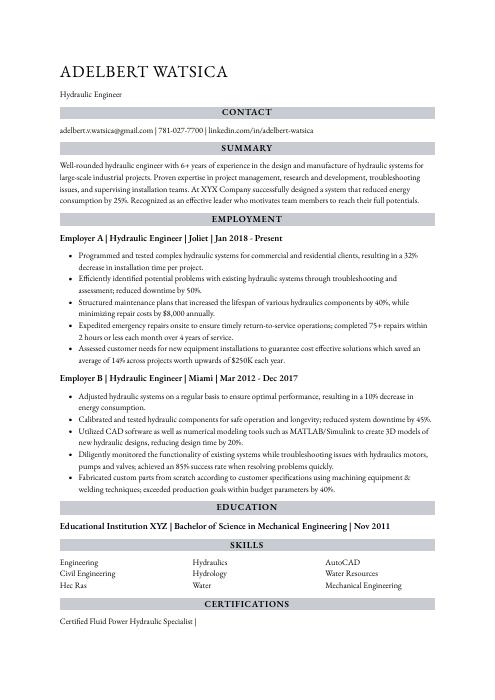 Numbat
Numbat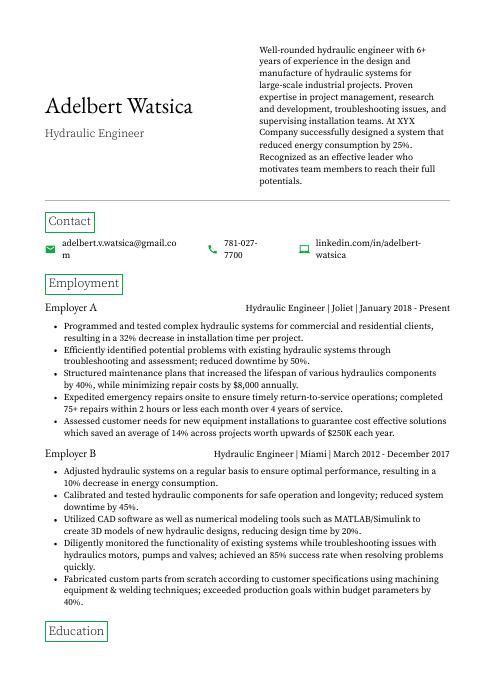 Quokka
Quokka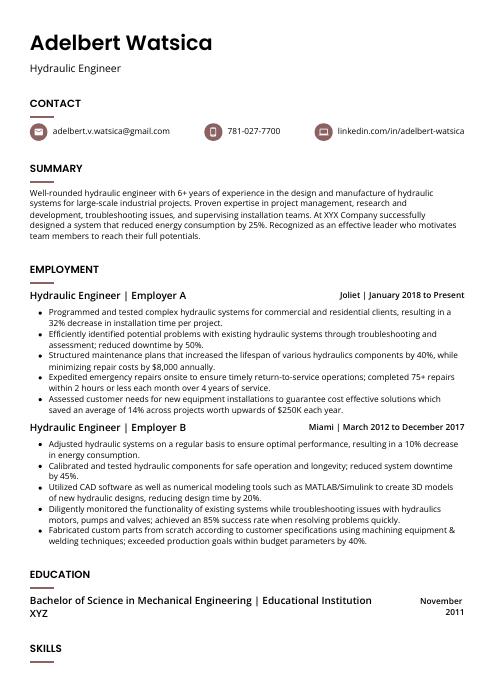 Fossa
Fossa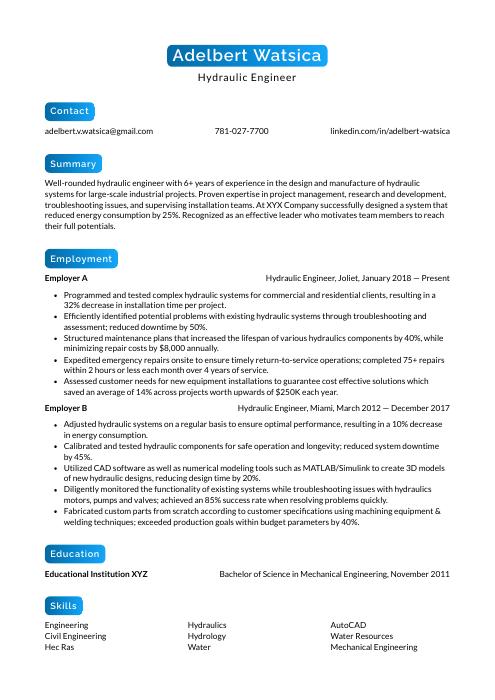 Kinkajou
Kinkajou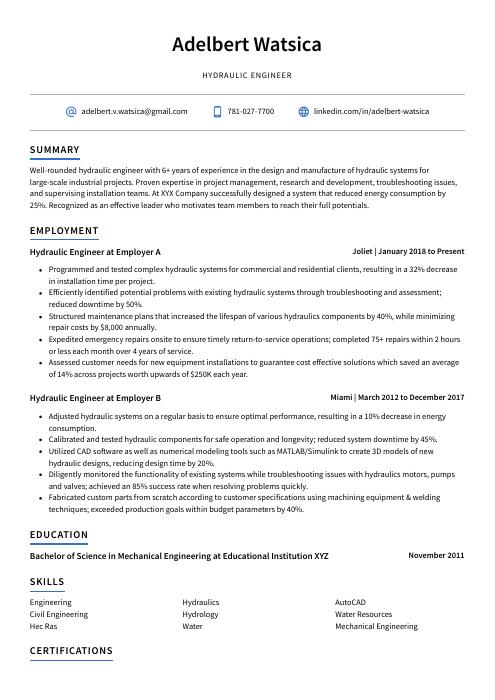 Axolotl
Axolotl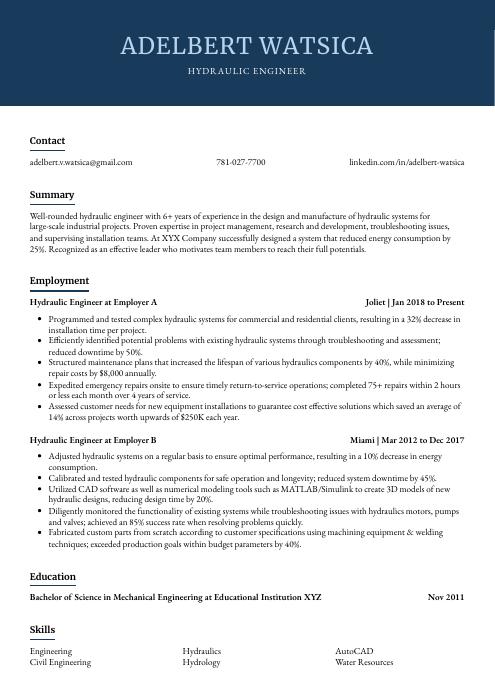 Bonobo
Bonobo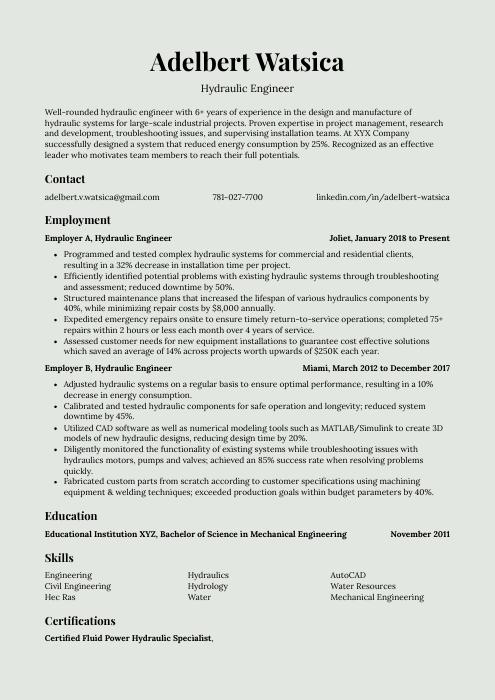 Saola
Saola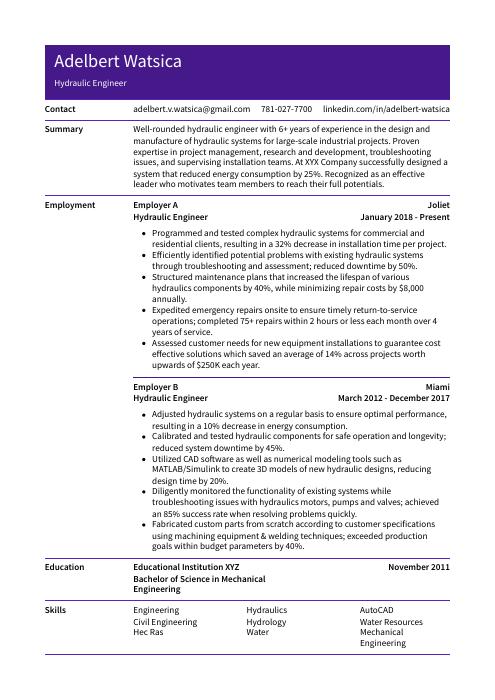 Pika
Pika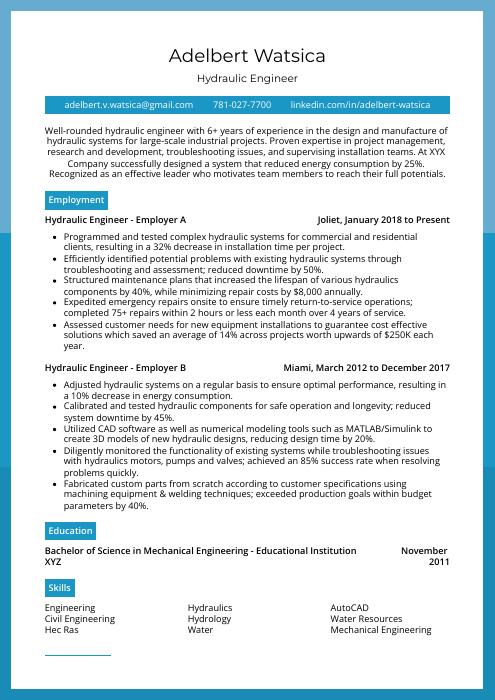 Rhea
Rhea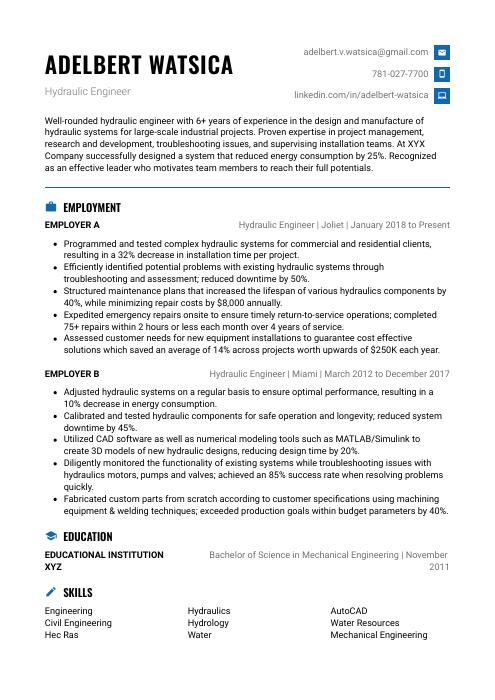 Echidna
Echidna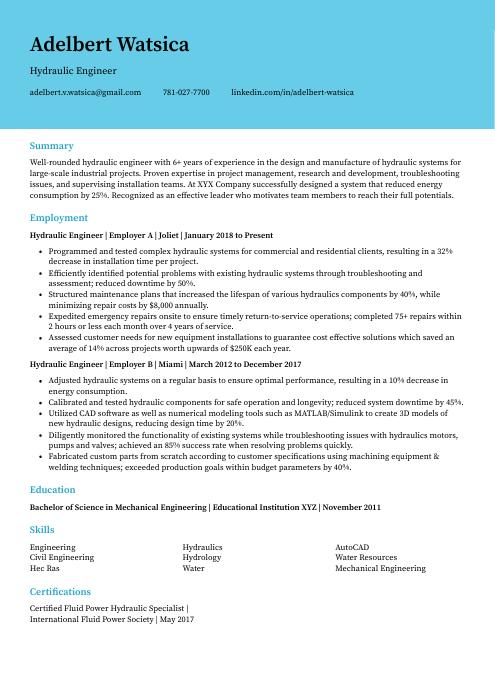 Dugong
Dugong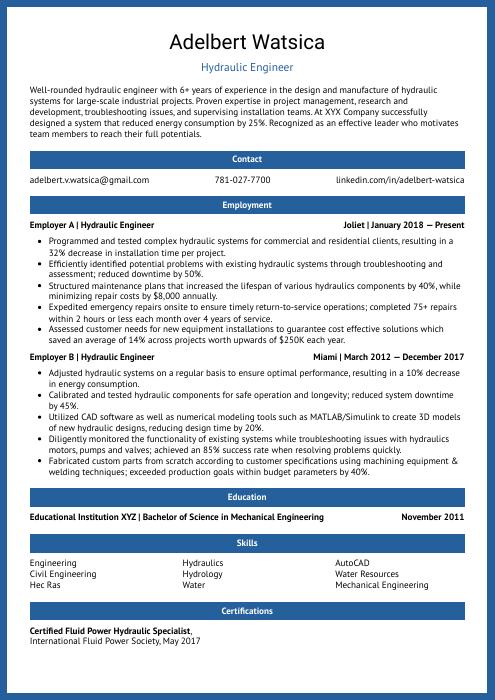 Ocelot
Ocelot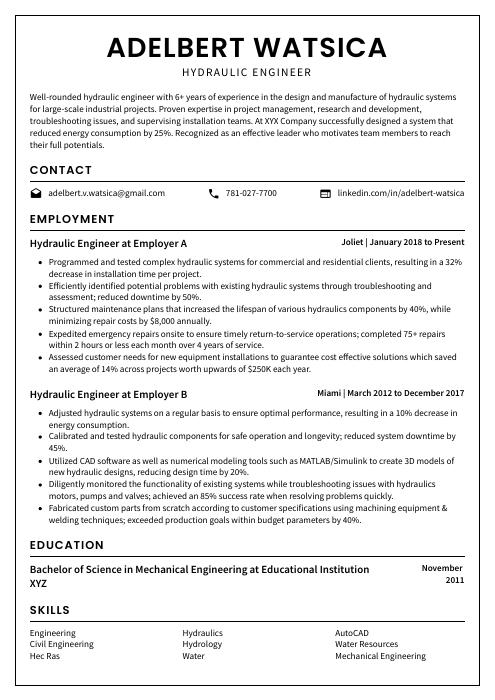 Cormorant
Cormorant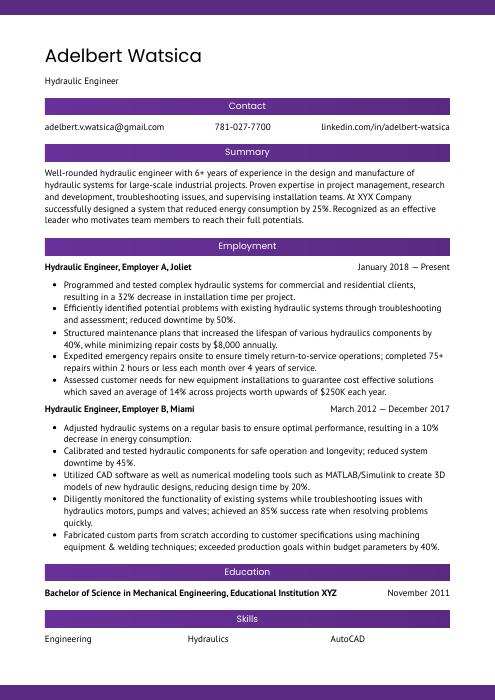 Jerboa
Jerboa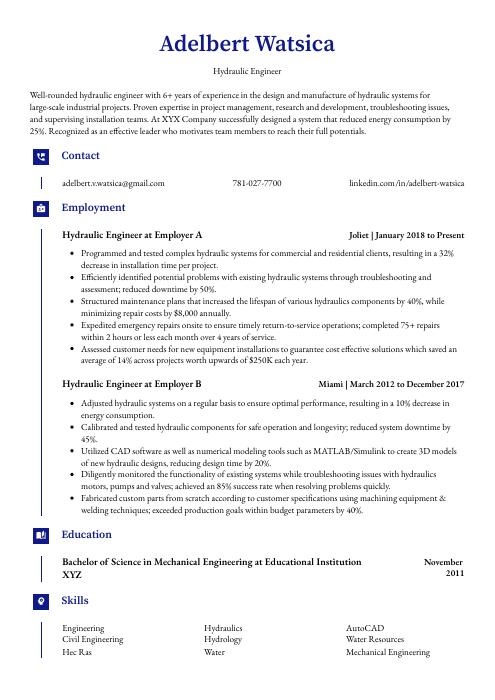 Gharial
Gharial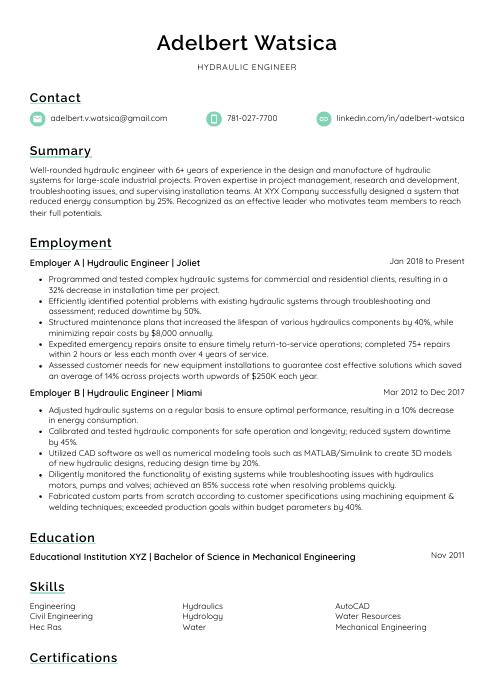 Lorikeet
Lorikeet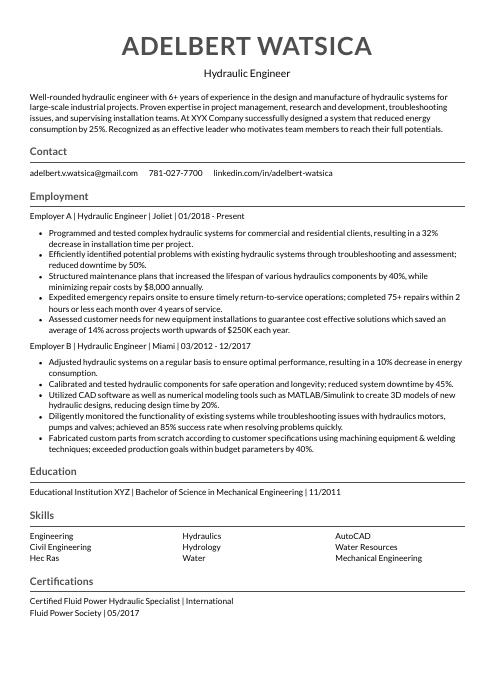 Indri
Indri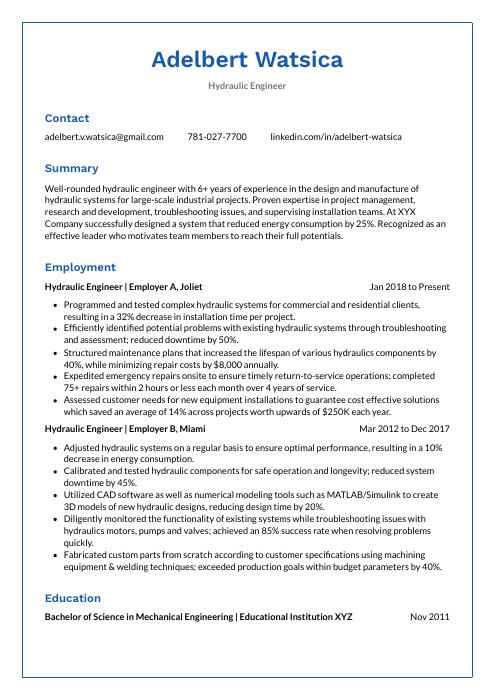 Markhor
Markhor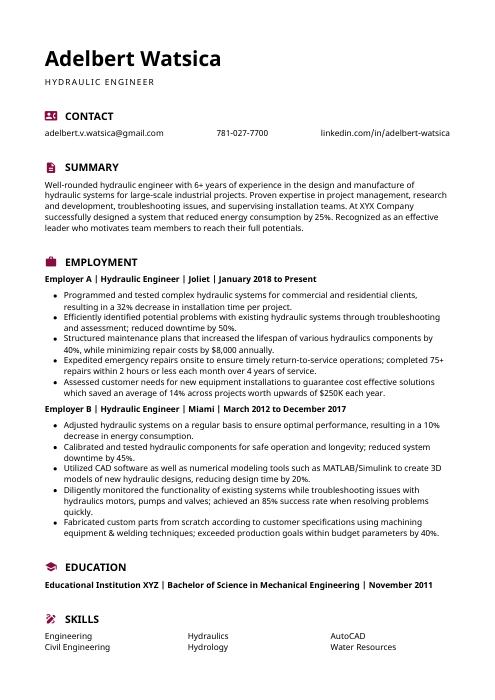 Hoopoe
Hoopoe Rezjumei
Rezjumei
